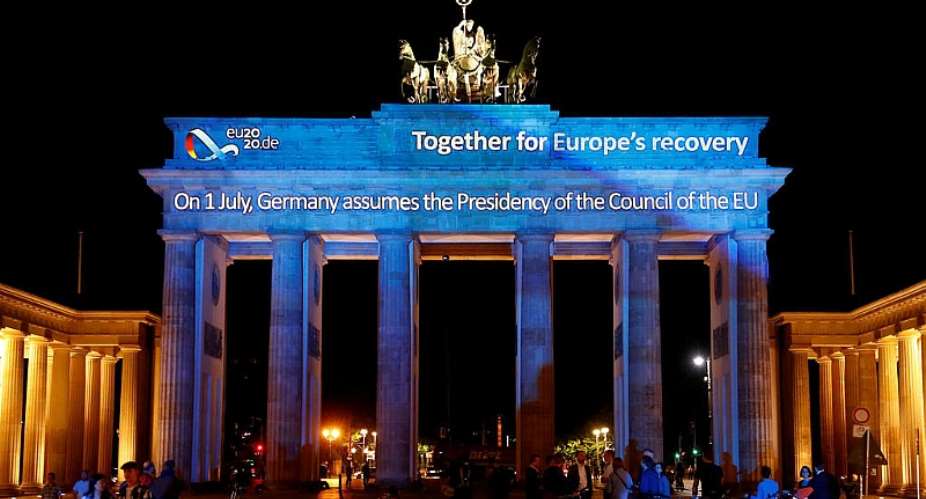Germany has taken over the European Union's rotating six-month presidency by signalling push for a 750-billion-euro deal to rebuild the European economies most affected by the coronavirus epidemic.
Germany marked the eve of its presidency by projecting the words “Together for Europe's recovery” onto the Brandenburg Gate in Berlin on Tuesday.
The 27-member bloc's largest country assumed the rotating presidency as Europe starts to rebuild its economies after the coronavirus epidemic and amid concerns of a possible second wave in the summer or autumn.
With just over a year remaining in what she says will be her final term, Chancellor Angela Merkel has endorsed a 750-billion-euro recovery proposal that marks a shift in Germany's position on sharing debt among member states.
“Europe's future is our future,” Merkel said during a meeting with French President Emmanuel Macron this week in support of the fund proposed by her former defence minister, new European Commission President Ursula von der Leyen.
Merkel urges 'solidarity'
The proposed fund would be financed with shared borrowing among EU member states.
Merkel's endorsement of the proposal marks an abrupt shift in Germany's long-held refusal to pool debt among member states.
Its first test will come at an EU summit on 17-18 July, where leaders will decide whether to adopt von der Leyen's proposal.
The proposal would likely see the money to go grants for countries hit hardest by the pandemic, including Italy and Spain, but Austria and the Netherlands are calling for the money to be issued in loans and not grants.
The north-south tensions are reminiscent of Eurozone debt crises of the early 2010s that saw northern EU members, including Germany, insist on harsh austerity measures for struggling southern states, especially Greece.
But unlike that time, Merkel has now urged reluctant members to “engage in an extraordinary act of solidarity”, warning that an uneven recovery could undermine the EU single market and end up harming stronger economies.
EU rethinking external relations
The German EU presidency comes at the bloc considers how to realign its trade and other relations on the international stage, notably with China and the United States.
It begins as the bloc opens its external borders, though entries are limited to certain countries that do not include the US.
Economy Minister Peter Altmaier said Germany planned to use the EU presidency to strengthen cooperation on health issues and to help the EU “reduce its one-sided dependency in supply chains,” in reference to how member states were scrambling to obtain protective material mainly made in China.
Berlin is also expected to advance a stalled EU-China investment agreement aimed at balancing relations between firms on both sides.
Brexit is nigh
Brexit is also looming over the next six months.
Britain completed its delayed departure from the EU on 31 January and now has until the end of the year to come to a new agreement on their future relationship, or default to high tariffs and business disruptions under World Trade Organization rules.
London and Brussels recently resumed talks over their future trade agreement, but Merkel said Wednesday that little progress was in sight and the negotiations could fail to produce a deal..
“I will keep pushing for a good solution, but the EU and Germany too must prepare for the case that an agreement is not reached,” Merkel told German MPs.
If there was no deal, Britain would “have to live with the consequences” of weaker economic ties with the bloc, Merkel added.





 Dumsor: Don't rush to demand timetable; the problem may be temporary — Atik Moha...
Dumsor: Don't rush to demand timetable; the problem may be temporary — Atik Moha...
 Space X Starlink’s satellite broadband approved in Ghana — NCA
Space X Starlink’s satellite broadband approved in Ghana — NCA
 2024 election will be decided on the grounds of the economy; choice of running m...
2024 election will be decided on the grounds of the economy; choice of running m...
 Dumsor: We're demanding less; just give us a timetable — Kwesi Pratt to ECG
Dumsor: We're demanding less; just give us a timetable — Kwesi Pratt to ECG
 Do I have to apologise for doing my security work, I won’t – Simon Osei-Mensah r...
Do I have to apologise for doing my security work, I won’t – Simon Osei-Mensah r...
 All my businesses have collapsed under Akufo-Addo — NDC Central regional chair
All my businesses have collapsed under Akufo-Addo — NDC Central regional chair
 Military, Prison Officers clash in Bawku, three injured
Military, Prison Officers clash in Bawku, three injured
 GRA-SML contract: MFWA files RTI request demanding KPMG report
GRA-SML contract: MFWA files RTI request demanding KPMG report
 Court threatens to call second accused to testify if NDC's Ofosu Ampofo fails to...
Court threatens to call second accused to testify if NDC's Ofosu Ampofo fails to...
 Family accuses hospital of medical negligence, extortion in death of 17-year-old...
Family accuses hospital of medical negligence, extortion in death of 17-year-old...
